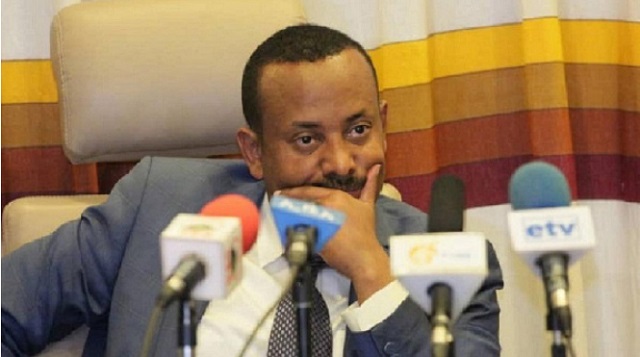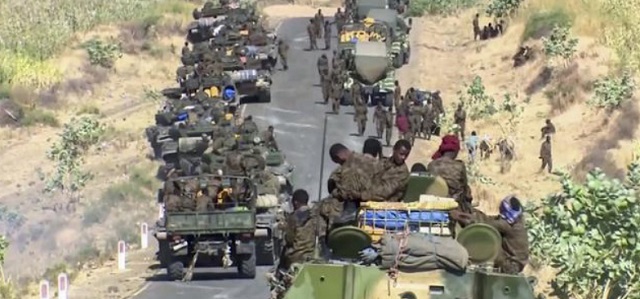
Capturing Addis Ababa?
Meanwhile, there were reports that fighters loyal to Tigray’s former ruling party, the Tigray People’s Liberation Front (TPLF), have joined forces with the Oromo Liberation Army (OLA), a rebel group fighting for the rights of people from Oromia, Ethiopia’s most populous region, were advancing toward Addis Ababa. They had already claimed control of several towns on the route to the Ethiopian capital.
But the Addis Ababa police spokesperson, Fasika Fenta, told CNN on Nov. 04 that although fighters allied against the central government were pushing south, they were nowhere near the capital and claims otherwise are “propaganda.”
“TPLF and OLA are spreading propaganda claims larger than what they are actually achieving. But they are actually being repelled from the places they are in now,” said Fasika, denouncing their claims as “lies.”
As he spoke, French channel, France 24, was reporting that streets and shops in Addis Ababa, a city of around five million people, were busy as usual on Nov.04 morning, though some residents said there was a feeling of uneasy calm.
“There are rumors about the approach of the rebels. People debate about the conflict, most of the people accuse the government for what happened,” said one man, who spoke to France 24 on condition of anonymity.
Police spokesperson Fasika Fanta confirmed that police had arrested “many people” in Addis Ababa since the government declared the state of emergency.
Residents told Reuters many Tigrayans had been arrested but Fasika said arrests were not based on ethnicity.
“We are only arresting those who are directly or indirectly supporting the illegal terrorist group,” he said. “This includes moral, financial and propaganda support.”
He also said many people were registering weapons at police stations around the city in line with a government directive issued on Nov.02 for people to prepare to defend their neighbourhoods.
“Some are even coming with bombs and heavy weapons. We are registering those too,” he said.
A spokesperson for the OLA also told CNN on Nov.04 that the closest area the joint forces held was the town Gerba Guracha, which is 160 kilometers (99 miles) north of the capital. He added that it was a misconception that OLA operations in towns near the capital mean “our area of control has reached close to the capital city. That is not the case.”
According to several reports, the rebel forces from Tigray region have pushed to within a day’s drive of the capital Addis Ababa and are threatening to march on the city.
However, analysts say any conclusion to the year-long war could take far longer to play out, according to Reuters.
Forces loyal to the Tigray People’s Liberation Front (TPLF) would have to fight through hostile territory in the neighbouring region of Amhara to reach Addis.
They could also face resistance from other Ethiopians who fear the return to power of a party that ruled with an iron fist for the nearly three decades it dominated central government before Prime Minister Abiy Ahmed took office in 2018.
Oromiya, the region that surrounds Addis Ababa, is divided. Abiy is Oromo and support from Ethiopia’s largest ethnic group helped propel him to power after years of anti-government protests.
He lost some of that support when security forces detained thousands of Oromos, some of whom accused him of not doing enough for the community. Several Oromo leaders were also detained in the wake of deadly riots that killed hundreds.
The TPLF has since forged an alliance with the Oromo Liberation Army (OLA), which is also fighting the central government. This week, both groups said they had seized strategic towns in Amhara and were considering advancing onto Addis Ababa.
Billene Seyoum, the prime minister’s spokeswoman, said the alliance could not be relied on to deliver democracy.
“The opening up of the political space three years ago provided ample opportunity for contenders to settle their differences at the ballot box in June 2021,” she said in a tweet.
Regional diplomats, speaking on condition of anonymity, said the threats to march on Addis could be a tactic to try to force Abiy into negotiations or to step down. TPLF spokesman Getachew Reda, who did not respond to requests for comment, has said there should be an interim government and Abiy should be put on trial.
Ethiopian officials have accused Tigrayan forces of exaggerating territorial gains. Spokespeople for the government and military did not return calls seeking comment on the threats by both groups.
Tigrayan forces could instead try to increase pressure on Abiy’s government by cutting off the landlocked country from the region’s main seaport. They could also enter the capital with or behind their Oromo allies.
“The operation will be spearheaded by the OLA,” said Oda Tarbii, an OLA spokesman. “This is simply our land and therefore within our jurisdiction.”
 Hostility in capital
Hostility in capital
The conflict in what was once considered a stable Western ally in a volatile region has killed thousands of people, plunged around 400,000 in Tigray into famine, and sent more than 2.5 million fleeing their homes.
William Davison, a senior analyst at the International Crisis Group think tank, said there could be a severe backlash if Tigrayan and Oromo forces took the capital.
“Amhara region might go into outright rebellion if the Tigray forces with OLA control Addis Ababa. Amharas are not only angry at the TPLF and OLA but also at federal leaders for leaving Amhara exposed,” he said.
Fighting their way into the capital – home to the African Union headquarters and many international delegations – could be bloody.
Addis Ababa has been a hotbed of opposition to TPLF rule since the party oversaw a crackdown that netted 30,000 people following elections in 2005.
The TPLF had dominated national politics for nearly three decades but lost much influence when Abiy took office in 2018.
The TPLF then accused him of centralizing power at the expense of Ethiopia’s regional states – an accusation Abiy, who won the Nobel Peace Prize for his efforts, denies.
“I don’t think TPLF will make it to Addis Ababa. I am not scared at all,” said Teferi Mekonnen, a 30-year-old employee at a petrol station, on Nov.04. “If the government gives me a weapon and asks me to fight, I will. No one is willing to see them back.”
Abiy might also call on Eritrea for help again. Eritrean troops entered Tigray in November to support Ethiopian soldiers; they mostly pulled out in June after a flood of reports of mass killings of civilians and gang rapes. Eritrea has denied committing abuses.
Calls are growing from international partners for a ceasefire and talks, including from regional heavyweights Uganda and Kenya and donors like the European Union and United States, which suspended Ethiopia’s valued duty-free trade access this week.
So far there is little sign either side wants talks. But a few Ethiopian voices are starting to publicly call for peace.
“Abiy’s authority has remained intact so far,” said Davison. “But given all the pressure, it is possible that the floodgates (of discontent) could open.”
****
 The Independent Uganda: You get the Truth we Pay the Price
The Independent Uganda: You get the Truth we Pay the Price



